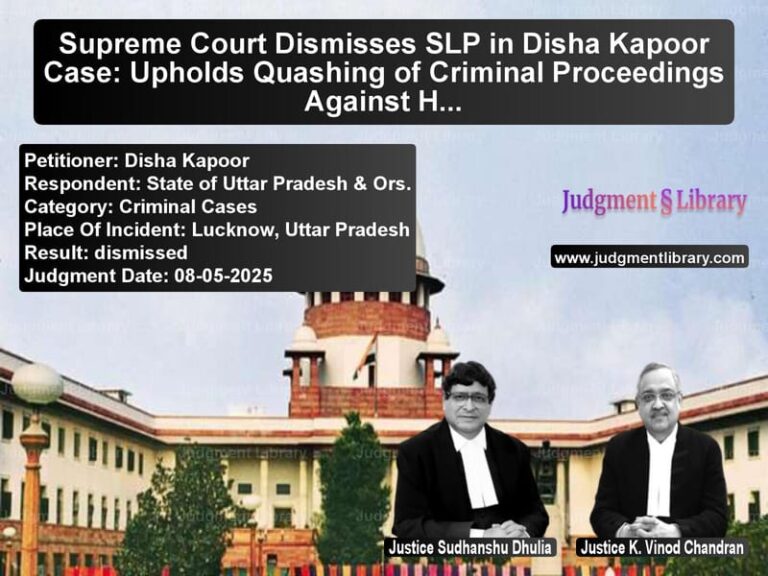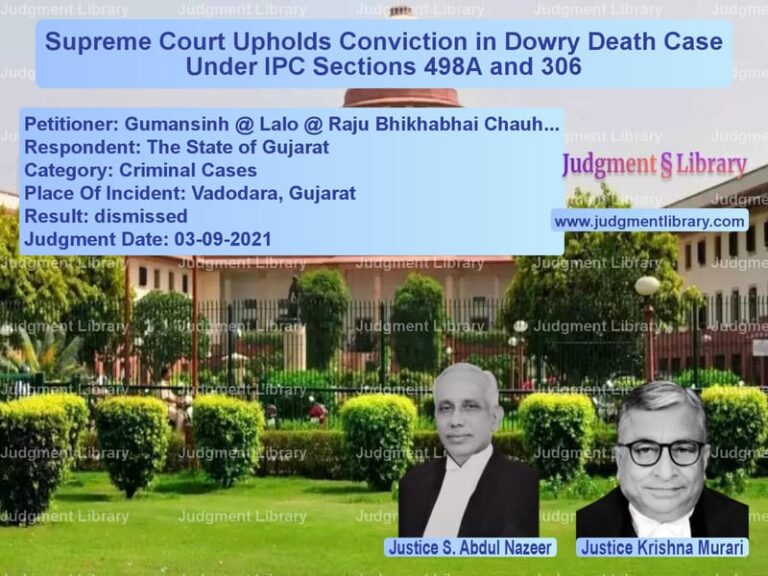Supreme Court Upholds Dismissal of CRPF Constable for Misuse of Service Weapon
The case of Union of India & Ors. v. Dalbir Singh revolved around the dismissal of a CRPF constable for allegedly firing his service weapon within a camp, leading to the death of a superior officer and injuries to another. The Supreme Court examined whether the disciplinary proceedings were legally conducted and if the dismissal was justified.
Background of the Case
Dalbir Singh, a General Duty Constable in the Central Reserve Police Force (CRPF), was accused of firing his service rifle on April 11, 1993, at Battalion Headquarters, Fatehabad. The incident resulted in the death of Head Constable Harish Chander and injuries to Deputy Commandant Hari Singh. An FIR was lodged against him under Sections 302 and 307 of the IPC, along with Section 27 of the Arms Act.
He was convicted by the trial court and sentenced to life imprisonment. However, in appeal, the Punjab and Haryana High Court acquitted him, citing discrepancies in the recovery of evidence. Despite his acquittal, he was dismissed from service on December 21, 1996. After being reinstated in 2012, a fresh departmental inquiry led to his re-dismissal.
Key Issues Before the Supreme Court
- Whether the disciplinary proceedings were legally valid after his criminal acquittal.
- Whether the CRPF could conduct a fresh inquiry based on the same incident.
- Whether the High Court erred in setting aside the dismissal order.
Arguments by the Petitioner (Union of India)
The government argued that:
- The acquittal in the criminal case was based on technical grounds, not a declaration of innocence.
- The departmental inquiry was independent and conducted per service rules.
- Witness testimony confirmed that Dalbir Singh misused his service rifle.
- Given the gravity of the offense, he was unfit to serve in a disciplined force like the CRPF.
Arguments by the Respondent (Dalbir Singh)
Dalbir Singh contended that:
- His acquittal in the criminal case should have resulted in reinstatement.
- The departmental inquiry was flawed and biased.
- The delay in conducting the fresh inquiry (2013) was unjustified.
- He was a victim of a false case due to a lack of evidence.
Supreme Court’s Analysis
The Supreme Court, comprising Justices Hemant Gupta and V. Ramasubramanian, analyzed the legal principles governing departmental inquiries and their independence from criminal trials.
Key Findings
- Acquittal in a criminal case does not bar departmental action: The Court reiterated that disciplinary proceedings operate under a different standard than criminal trials, relying on “preponderance of probability” rather than “beyond reasonable doubt.”
- Departmental inquiry was based on credible evidence: Testimonies from six witnesses, including Constable D.K. Mishra, confirmed that Dalbir Singh fired his rifle inside the camp.
- High Court exceeded its jurisdiction: The Supreme Court criticized the Delhi High Court for re-evaluating evidence and interfering in disciplinary matters.
Key Observations by the Supreme Court
“Judicial review in disciplinary matters is limited to ensuring fairness in procedure. It does not extend to re-appreciating evidence.”
“The acquittal of an employee in a criminal trial does not automatically entitle them to reinstatement, especially in cases involving serious misconduct.”
Final Judgment
The Supreme Court ruled:
- The Delhi High Court’s order reinstating Dalbir Singh was set aside.
- The dismissal order of December 21, 1996, was restored.
- Dalbir Singh’s petition for reinstatement was dismissed.
Implications of the Judgment
This ruling has significant implications:
- Confirms the independence of departmental inquiries: Acquittal in a criminal case does not automatically nullify disciplinary proceedings.
- Sets a precedent for misconduct in disciplined forces: The judgment reinforces that armed forces personnel must maintain the highest standards of conduct.
- Limits judicial interference in service matters: Courts must exercise caution when reviewing disciplinary decisions.
Conclusion
The Supreme Court’s decision in Union of India v. Dalbir Singh underscores the importance of maintaining discipline within armed forces. It clarifies that even if an individual is acquitted in a criminal case, misconduct proven in a departmental inquiry can justify dismissal. This ruling reinforces the principle that disciplinary standards are distinct from criminal liability and must be upheld for the integrity of the service.
Petitioner Name: Union of India & Ors..Respondent Name: Dalbir Singh.Judgment By: Justice Hemant Gupta, Justice V. Ramasubramanian.Place Of Incident: Fatehabad, Haryana.Judgment Date: 21-09-2021.
Don’t miss out on the full details! Download the complete judgment in PDF format below and gain valuable insights instantly!
Download Judgment: union-of-india-&-ors-vs-dalbir-singh-supreme-court-of-india-judgment-dated-21-09-2021.pdf
Directly Download Judgment: Directly download this Judgment
See all petitions in Disciplinary Proceedings
See all petitions in Public Sector Employees
See all petitions in Termination Cases
See all petitions in Judgment by Hemant Gupta
See all petitions in Judgment by V. Ramasubramanian
See all petitions in allowed
See all petitions in Restored
See all petitions in supreme court of India judgments September 2021
See all petitions in 2021 judgments
See all posts in Service Matters Category
See all allowed petitions in Service Matters Category
See all Dismissed petitions in Service Matters Category
See all partially allowed petitions in Service Matters Category







